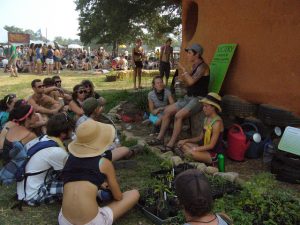Bard CEP News
Green Festivals Inspiring Green Cities
By meganlynchAs the impacts of climate change become more of a reality, many cities are developing sustainability plans to guide them towards a greener future. While setting the goals within these plans can be challenging, it is an even greater challenge to achieve them.
Many of these plans focus on specific issue areas, such as:
- Managing waste
- Increasing use of renewable energy
- Preserving green spaces
- Educating citizens on local environmental issues.
Once these goals are set, cities must determine what initiatives will be most effective at inspiring change. However, it can be difficult to determine which initiatives will be successful and which will just be costly and time consuming letdowns.
The best way to reduce this risk is to consider initiatives that have already been tested under similar conditions. One source of similar initiatives might seem unlikely at first glance: music festivals.
The Music Festival Muse
Major music festivals, such as Coachella or Bonnaroo, are essentially tiny, transient cities. For a brief span of time, these heavily populated festivals require many of the same services as a major city:
- Transportation to/from/within the festival
- Waste management
- Adequate provision of food and water
- Housing
- Energy
As a result, music festivals face similar environmental challenges as a major city. Since they share similar problems, one could assume they also share similar solutions. Cities looking for creative and innovative approaches to their environmental problems can therefore look to a range of practices that the music festival industry has developed over time for inspiration.
Some of the best sustainability practices developed by major music festivals in the United States include:
Emissions Reduction Initiatives

Carpoolchella: Coachella incentivizes festival goers to carpool to the event by offering free VIP passes for life to a randomly selected car of four or more people. By encouraging attendees to travel together, the festival limits emissions associated with the festival.
Cities could emulate this practice to help meet emissions reduction targets. This can be done by offering other kinds of attractive incentives for carpooling, such as preferred parking spaces or even a cash incentive.
Waste Reduction Initiatives
Refill Revolution: Bonnaroo has partnered with Plastics Pollution Coalition and Steelys Drinkware to develop high quality, reusable water bottles that are sold for $5 throughout the festival. The goal of this initiative is to encourage attendees to stay hydrated, but also to significantly reduce plastic waste from plastic bottles and disposable cups.
Cities could encourage a similar move away from plastics by offering citizens low cost reusable bottles or even banning the use of plastic water bottles.
Bonnaroo Food Recovery: A team of volunteers at Bonnaroo partnered with Sysco, one of their main food distributers, to recover 9 tons of food from vendors. This food was then donated to the Grundy County Food Bank to feed over 200 families in the area.
Cities can consider implementing a food waste collection and composting program. Food waste is often a large and costly portion of municipal solid waste. This kind of program can solve that problem by diverting a large portion away from landfills and providing hungry families with food.
Education and Community Initiatives
The Planet Sustainable Camp: One of Bonnaroo’s multiple camping options, referred to as People + the Planet, gives campers the option to live in a setting with others interested in discussing ways to reduce their own environmental impact, as well as the overall impact of the festival. This experience is supplemented by lectures given by sustainability experts in various fields.

Cities could mimic this by providing citizens with opportunities to meet and converse, such as sustainability themed retreats or monthly forums. These kinds of conversations will result in innovative ideas and a stronger sense of community.
Bonnaroo Learning Garden: This garden gives attendees the opportunity to learn the fundamentals of gardening through classes offered throughout the duration of the festivals. These classes cover a wide range of topics from natural remedies to urban livestock.
This initiative could be implemented on a larger scale through the development of community gardens. These gardens give citizens the opportunity to gain a better understanding of where food comes from, encourage the consumption of locally grown food, and help keep urban air clean.
The Festival Laboratory
While these different initiatives have proven to be very effective in the music festival setting, they may not provide enough ideas to remedy every problem a city is facing.
In this situation, a music festival still provides a useful service. Instead of being a source of inspiration, it can serve as a controlled experiment in which different policies and products can be tested. This gives policymakers and product designers the opportunity to gain valuable feedback in order to develop a more successful product for the greater population.
The Way Forward
As cities around the world begin implementing new initiatives to better protect the environment, policymakers will need to develop highly effective initiatives to encourage change. Music festivals can play an important role in this process by providing inspiration for and feedback on products and policies that will ensure the best possible end product. Policymakers should take better advantage of this opportunity in order to conserve time and money while also promoting a more sustainable future.
Posted on 3 May 2017 | 6:37 pm

